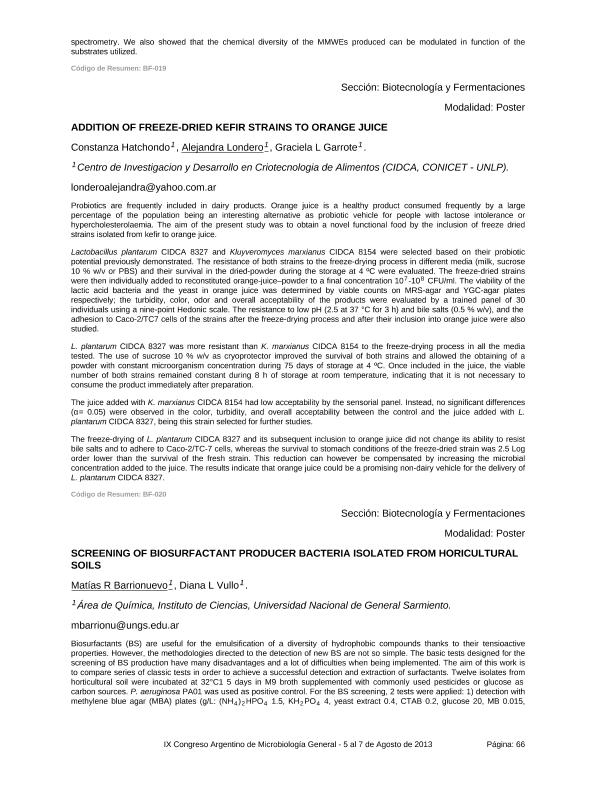Evento
Addition of freeze-dried kefir strains to orange juice
Tipo del evento:
Congreso
Nombre del evento:
IX Congreso Argentino de Microbiología General
Fecha del evento:
05/08/2013
Institución Organizadora:
Sociedad Argentina de Microbiología General;
Universidad Nacional de Rosario;
Título del Libro:
IX Congreso Argentino de Microbiología General
Editorial:
Sociedad Argentina de Microbiología General
Idioma:
Inglés
Clasificación temática:
Resumen
Probiotics are frequently included in dairy products. Orange juice is a healthy product consumed frequently by a large percentage of the population being an interesting alternative as probiotic vehicle for people with lactose intolerance or hypercholesterolaemia. The aim of the present study was to obtain a novel functional food by the inclusion of freeze dried strains isolated from kefir to orange juice. Lactobacillus plantarum CIDCA 8327 and Kluyveromyces marxianus CIDCA 8154 were selected based on their probiotic potential previously demonstrated. The resistance of both strains to the freeze-drying process in different media (milk, sucrose 10 % w/v or PBS) and their survival in the dried-powder during the storage at 4 ºC were evaluated. The freeze-dried strains were then individually added to reconstituted orange-juice–powder to a final concentration 107 -108 CFU/ml. The viability of the lactic acid bacteria and the yeast in orange juice was determined by viable counts on MRS-agar and YGC-agar plates respectively; the turbidity, color, odor and overall acceptability of the products were evaluated by a trained panel of 30 individuals using a nine-point Hedonic scale. The resistance to low pH (2.5 at 37 °C for 3 h) and bile salts (0.5 % w/v), and the adhesion to Caco-2/TC7 cells of the strains after the freeze-drying process and after their inclusion into orange juice were also studied. L. plantarum CIDCA 8327 was more resistant than K. marxianus CIDCA 8154 to the freeze-drying process in all the media tested. The use of sucrose 10 % w/v as cryoprotector improved the survival of both strains and allowed the obtaining of a powder with constant microorganism concentration during 75 days of storage at 4 ºC. Once included in the juice, the viable number of both strains remained constant during 8 h of storage at room temperature, indicating that it is not necessary to consume the product immediately after preparation. The juice added with K. marxianus CIDCA 8154 had low acceptability by the sensorial panel. Instead, no significant differences (α= 0.05) were observed in the color, turbidity, and overall acceptability between the control and the juice added with L. plantarum CIDCA 8327, being this strain selected for further studies. The freeze-drying of L. plantarum CIDCA 8327 and its subsequent inclusion to orange juice did not change its ability to resist bile salts and to adhere to Caco-2/TC-7 cells, whereas the survival to stomach conditions of the freeze-dried strain was 2.5 Log order lower than the survival of the fresh strain. This reduction can however be compensated by increasing the microbial concentration added to the juice. The results indicate that orange juice could be a promising non-dairy vehicle for the delivery of L. plantarum CIDCA 8327.
Palabras clave:
Probiotics
,
Lactobacillus
,
Yeasts
,
Orange Juice
Archivos asociados
Licencia
Identificadores
Colecciones
Eventos(CIDCA)
Eventos de CENTRO DE INV EN CRIOTECNOLOGIA DE ALIMENTOS (I)
Eventos de CENTRO DE INV EN CRIOTECNOLOGIA DE ALIMENTOS (I)
Citación
Addition of freeze-dried kefir strains to orange juice; IX Congreso Argentino de Microbiología General; Rosario; Argentina; 2013; 66-66
Compartir




